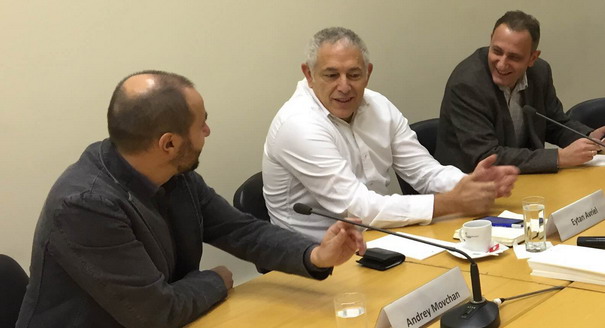Registration
You will receive an email confirming your registration.
Israel’s economy is very successful, but there are some key problems which act as impediments to the country’s future economic and social development.
The Carnegie Moscow Center hosted Israeli expert and journalist Eytan Avriel, a co-founder of TheMarker and the chief editor of TheMarker.com, for an event on the current status of Israel’s economy. Avriel gave an overview of the problems facing Israel’s economy and society, and also discussed the country’s economy in the context of global and regional challenges. Andrey Movchan, director of the Carnegie Moscow Center’s Economic Policy Program, and Andrei Kolesnikov, chair of the Center’s Russian Domestic Politics and Political Institutions Program, moderated.
Discussion Highlights
- Successes: Avriel pointed out that Israel has become a birthplace for many startup companies and a hub for multinational corporations producing cutting edge technology. As a developed country, it is a member of the Organisation for Economic Co-operation and Development (OECD). He noted that the Israeli GDP per capita is equivalent to those of other advanced economies.
- Problems: However, Avriel also acknowledged some of the major challenges facing the Israeli economy and society, including a high cost of living, rising income inequality, “tribalization” of different social groupings such as secular Jews, orthodox Jews, and Arabs, a lack of competition in the internal market, and low achievement in education.
- Region: Avriel stressed the importance of seeing Israel in its regional context. Unlike other developed countries, he said, Israel is located in the dangerous region where the country is under constant threat.
- Economic Relations: Avriel described the relatively low level of trade between Israel and Russia, despite a strong trade complementarity and cultural ties, as a “missed opportunity.” He suggested a number of possible reasons for this missed opportunity, including the fact that Israel’s technology sector is oriented primarily toward the United States, where profit is more lucrative, and that Israel is reluctant to sell its cybertechnology to Russia due to the latter’s association with number of cyberattacks targeting European countries.
Eytan Avriel
Eytan Avriel is a well-known Israeli expert and journalist. He is a co-founder of TheMarker, the business newspaper of the Haaretz Group, and is also the chief editor of TheMarker.com. He is one of the group’s leading op-ed columnists.
Andrey Movchan
Andrey Movchan is a senior associate and the director of the Economic Policy Program at the Carnegie Moscow Center.
Andrei Kolesnikov
Andrei Kolesnikov is a senior associate and the chair of the Russian Domestic Politics and Political Institutions Program at the Carnegie Moscow Center.
